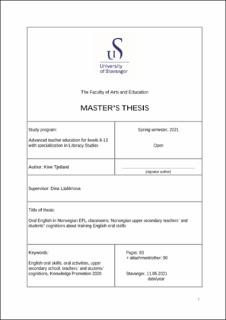| dc.description.abstract | This thesis addressed the issue of the teaching and training of English oral skills in Norwegian upper secondary English as a Foreign Language (EFL) classrooms, based on factors such as the EFL teachers’ and their students’ cognitions. The study aimed to answer two main research questions, one on the teachers’ cognitions and one on the students’ cognitions, further divided into six sub-questions. Specifically, the first main research question concerned the teachers’ beliefs about, experiences with, and practices towards teaching oral English, while the second main research question focused on the students’ beliefs about, experiences with, and attitudes towards training English oral skills. As the new English subject curriculum (Knowledge Promotion 2020, henceforth LK20) was introduced in August 2020, the thesis also explored how the teaching of oral English was affected by the new reform. Finally, as digital teaching became part of everyday practice during the COVID-19 pandemic, the thesis investigated how digital EFL lessons impacted the teaching and training of English oral skills.
In order to answer the research questions, mixed methods research was conducted. In particular, the researcher used teacher interviews, student questionnaires, and classroom observations as research instruments. Three Norwegian upper secondary EFL teachers were interviewed to investigate the teachers’ beliefs, practices, and experiences. Furthermore, a student questionnaire was filled out by sixty-nine Norwegian upper secondary students to explore the students’ beliefs, experiences, and attitudes. Finally, one EFL lesson in each of the three interviewed teachers’ classrooms was observed in order to examine how the training of oral English worked in practice.
The main findings regarding the first research question revealed that the teachers believed it to be important to connect English oral activities to the world outside of the classroom, in addition to being related to the students’ interests, proficiency levels, and abilities. The time devoted to oral skills in EFL lessons seemed to vary greatly, and the teachers explained that this depended on factors such as the students’ willingness to communicate orally and the amount of time available to oral activities. The teachers reported that reluctant and anxious speakers were an issue that significantly impacted the teaching of English oral skills, and helping reluctant and anxious speakers overcome their fear of speaking English was a demanding task that required a significant amount of time and substantial resources. The teachers’ experiences showed that the challenges in the regular EFL classroom in terms of students’ reluctance to speak English were exacerbated in the digital EFL classroom. However, the teachers had positive experiences with using the “breakout-rooms” function on Teams, which allowed students to work together in pairs or smaller groups. The findings regarding the impact of the new curriculum (LK20) on the teaching of oral English revealed that the teachers were, to some extent, uncertain about how to teach the new curriculum aims and how to assess their students as part of training, which resulted in varying teaching practices.
The main findings regarding the second research question revealed that the students shared a common belief that the most effective way to improve their English oral skills was through interaction with others, primarily through real-life conversations and discussions. Oral activities that involved conversations and discussions with others were also regarded as the most motivating activities, as these activities were perceived as interesting, exciting, and valuable for their language improvement. Most students seemed to have positive attitudes towards practicing their oral skills in the English subject but acknowledged that they sometimes were reluctant to speak English in situations where they were told to speak in front of the whole class or when the teacher was assessing them. In digital EFL lessons, the students reported being particularly reluctant to participate orally, possibly due to the high self-exposure and pressure involved in the activity.
The results of this study have contributed to gaining a deeper understanding of the Norwegian upper secondary EFL teachers’ and their students’ cognitions about the training of English oral skills in the EFL classroom, including more knowledge on oral activities Norwegian upper secondary students do inside the EFL classroom and activities the EFL teachers and their students believe to be most motivating and important for the promotion of English oral skills. Furthermore, the findings on the implementation and use of the new curriculum have created an awareness of some issues related to LK20 and are a steppingstone to further research focusing on teaching and assessing oral skills in Norwegian EFL classrooms. Finally, the results of this study have contributed to the scarce knowledge about the training of English oral skills in digital classrooms. | |
